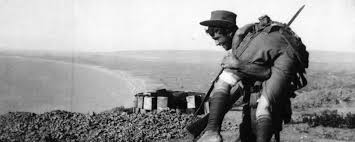The war of 1914-18 was the greatest blood-letting man had perpetrated on his own species to this point in recorded history. Novelists in the years preceding the opening of hostilities had attempted to portray the horror and carnage that a modern industrial war would unleash, they didn’t come close.
The arms race, which was at its height between 1908 and 1914, meant that military spending in Europe increased by 50 per cent. This increase in spending on armaments prompted the British Chancellor of the Exchequer, David Lloyd George to write of it in January 1914: “I cannot think of any advantage which has been reaped by any country in the world from this increase in military and naval expenditure. But I can think of a good deal of harm which has been done to all countries . . . The common sense of the industrial classes, be they capitalist or labour, has risen against this organized insanity. This is a propitious moment for reconsidering the question of armaments.” None of the European adversaries took any notice.
What can be argued with justification is that the monarchies of all four of the great powers, Britain, Russia, Austro-Hungary and Germany were either unprepared for leadership, too old, or irrational and easily manipulated by a small coterie of military advisers. All four failed to provide the resolution, direction or coordination of their respective foreign policies. They were little more than spectators as Europe and the world in the words of David Lloyd George, “slithered over the brink into the boiling cauldron of war.”
By the end of the War, four major imperial powers—the German, Russian, Austro-Hungarian and Ottoman empires, and the other colonial powers of Italy, France, the Netherlands, Portugal and even Belgium — that controlled vast territories, were either destroyed or much reduced in influence. British and European society had undergone irrevocable change. It was in effect an historical full stop. It marked the definitive end of the Victorian era and the advent of a new age of uncertainty.
Australia, pre-War, was regarded as one of the most progressive and innovative countries on earth. Post-War, with the death of 62,000 of its finest and the wounding of 140,000 more, Australia became timid, tentative and inward looking – a broken nation.
BOOK REVIEW
This book is on World War 1 concerns itself with the ultimate and continuing futility of war. The book eloquently describes the situation in Europe prior to the start of hostilities in 1914, and continues in chapter form to chronologically document the salient stages of the war and their geopolitical ramifications.
The writer, whilst acknowledging the various combatants, clearly often gives an Australian perspective of the conflict, and relates many humorous anecdotes (and some not so humorous) which add to the richness of the dialogue.
The documenting of the events leading up to and including the war itself have been meticulously researched and presented and they make for absorbing reading. What makes this book so fascinating, however, is the portrayal of many of the main players in the conflict and their motives. One can almost imagine being there on the battlefield as decisions were made (or not as the case may be!)
This authoritative documentation of World War 1 and its aftermath concludes with a prelude to World War 2 and reinforces the notion of the futility of war.
Stewart Dickinson
Condition of Sale
All proceeds from the sale of this document will be forwarded to Phoenix Australia, Centre for Post Traumatic Mental Health at the University of Melbourne.
A minimum donation of $5.00 for each copy downloaded would be appreciated.
Contact MHHV Friend about this article.








